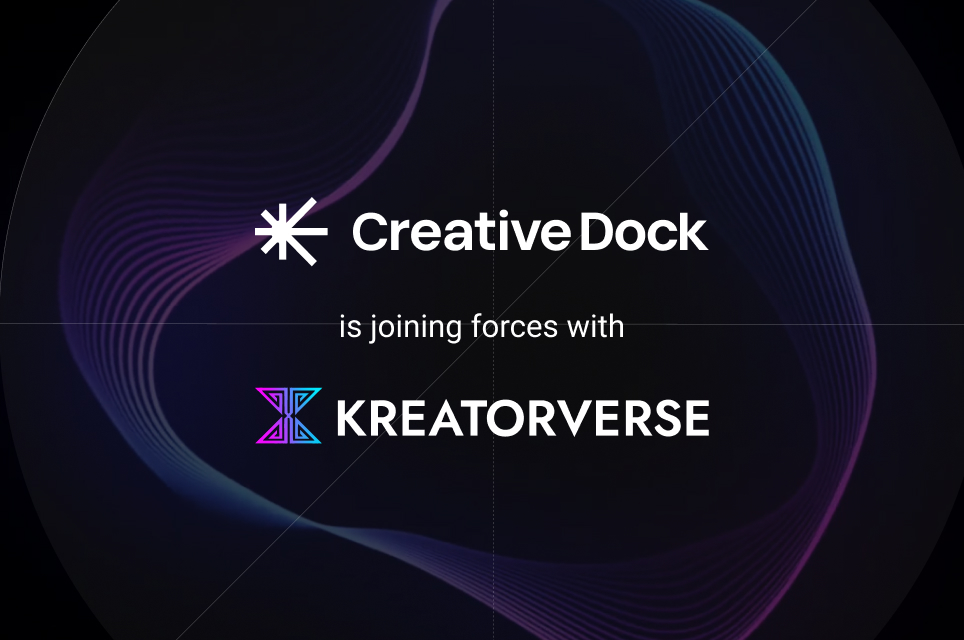Will content still be king in 2022? An update on content marketing strategies
How to generate meaningful brand content and how to approach new trends? We asked Creative Dock’s Head of Content, Michal Schindler.


“Content is king.” Hasn’t that become a kind of magic formula?
It has. If you try to figure out where it came from, you’ll probably trace it to Bill Gates. He wasn’t talking about “content marketing”, by the way, but rather the future of the Internet as a medium for transmitting and storing easily accessible information. Only over time has it become this buzzphrase related to customer engagement, brand management, and what have you. Anyway, just as you can’t say a generic thing like “books are great and Instagram is stupid ”, you can’t describe content that way. And unlike with books or Instagram, you can’t even describe exactly what content is.
Why do we need to generate content anyway?
This is a crucial question. It also answers your previous one in a way. There’s so much content because everyone believes it is the king, one that will somehow magically save their brand or improve its reputation. That they can’t do without it. And that adds to the already incredible volume of all kinds of content that is being created. Speaking in human terms — there is definitely no need to generate content. There’s already so much communication around us that most of it immediately becomes waste because it has no recipients. Companies aren’t pouring money down the drain, they are pouring it into their blogs. But the result is the same. If I had to answer as a marketer, content can actually improve a brand’s image. It can even save the brand. But only quality, interesting, inspiring, sincere content. Not just any word salad poured indiscriminately onto a blog, social media or, say, YouTube.

What does the ideal content marketing look like?
It can vary a lot. Depending on the brand, its situation on the market, its focus, the target audience, the goals the company wants to achieve, and so on. Basically anything can become content. But the essential measure of top-level content, in my opinion, is its unique self-sufficiency. Meaning that it’s still connected to the brand that produces it, but it’s somehow original and can stand on its own when it comes to being interesting and inspiring. My favorite example is from a non-corporate environment. The BBC magazine, Top Gear, managed to attract people who weren’t really interested in cars. But its production value, its appeal, its storytelling were so well done that the products themselves no longer played a role. That’s top level.
Strategy isn’t important?
It is, of course. When I talk about Top Gear, you’ll probably think of one particular episode, packed with great car tests, witty conversations, lots of fun. But even Top Gear works so great because it has a long-term strategy. No good content is a matter of one quarter. After a year, maybe a couple of people will notice you’re doing something above standard. It’s a long haul. And an investment. Let’s say if you’re really good at it, some time after two or three years, you can expect some spontaneous interest from readers, visitors, or viewers that you didn’t have to buy through campaigns. To count on content to push through in a matter of months means to get bitterly disappointed.

He was the Brand & Communications Manager at Vodafone CZ, where he made his name as the editor-in-chief of a hugely popular B2C magazine CILICHILI. Over the past 20+ years, he honed his leadership and writing skills in various companies and media outlets including Reflex magazine, JWT, Saatchi & Saatchi, and Publicis. Michal likes to call himself an experienced bookworm and metalhead.
How to cleverly connect content with a brand?
Thematically. Which may eventually mean product-wise or with some reference to your own services, but the primary interest of the editorial staff — which should be journalists, not copywriters or the PR department, — must be the quality of the message. How it benefits the reader. It’s generally worth outsourcing this sort of thing to a specialized agency, because people inside a company often find it hard to imagine that the basic premise of their work is: Noone is interested in our company. But, unless you’re a true lovebrand or at peace with the fact you’re only creating content for your hardcore fans, this is where you need to start — we’re a nobody.
Then how do you become somebody?
Imagine you’re reading something online. Say you like a cosmetics company and you come across their blog. And instead of articles about trends, the latest research on ingredients, refusing animal testing, etc., etc., you’ll find an interview with a marketing manager about how the latest campaign went. OMG! Who would want to read that? On the internet, you’re always just a few clicks away from the best articles in the world. Why would you read some corporate babble? Anyways, I stopped differentiating between corporate journalism and regular commercial journalism a long time ago. Your blog post is only one click away from my Top Gear bookmark. Can you hold my attention? Am I going to come back?

So how do we know if our content strategy is working?
It depends on what parameters you have set as your goals. The fabled KPIs. It could be traffic, time spent on page, building a database of leads, or direct conversions to the product part of the site. I usually keep this low key. While I understand and totally respect that a client mostly orders content and pays for it to support the brand and its sales in an original way, I don’t want to promise them any hard data. Let me repeat this: you’ll only see the benefits of your content over time. Plus, a big part of it is hardly measurable.

So content’s primary purpose shouldn’t be to sell.
It’s not even very good at it, to be honest. For me, content is mainly a part of brand strategy. So purely from my point of view, and I’m not saying this is some official opinion, content is working when it makes customers like the brand more than if there were no content. When it makes them visit the site more often, when it helps the brand reach more people, become a part of their lives, that kind of thing. When people wake up and check out their favorite Facebook and Instagram profiles, or even their favorite websites, and yours is among them, then I think your content strategy is working.

Which of your own projects are you the most proud of?
They were never just projects of my own. One man shows are not my thing, I don’t think I’d even have the nerve for that. I’ve always been lucky when it comes to colleagues and collaborators. And with the best projects, even open-minded clients who could afford a relatively expensive content. Plus, they didn’t expect it to turn into another sales channel in a matter of weeks. Good content, at least in my case, is based on teamwork and a bunch of other conditions. A great movie isn’t just made by the director. An experienced director can obviously choose a good subject, good colleagues, and can convince them of their point of view. So I’ve been trying for some 25 years to be that director. One who has ideas, but also enough acceptance and self-awareness to see potential, push the team to better results, but not hinder the specialists in their respective fields. It’s more about psychology, sociology, and fighting your inner demons than trying to be the best editor-in-chief, journalist, reporter, photographer, and graphic designer in one.

A lot of brands keep circling back to the obvious — like the same old blog posts about Easter, Christmas, how to relax properly. Is that a commendable approach?
Someone once wrote that after they read Anna Karenina, they suddenly found all the other books about love useless. Because Tolstoy, according to them, had said everything that could be said about love. But it doesn’t work like that. Nothing works like that. Of course you can write about Easter during Easter season. But will you copy-and-paste your article from Google, piecing it together from other sources, or will you try and find a fresh point of view, come up with inspiring tips, really get into it? Of course, it may still end up trivial, but I certainly wouldn’t dismiss any topic in advance. That way, noone could write about anything. Everything has been done before. But if you have a basket-making business or a chocolate company, you’re not going to skip Easter. What on Earth would you be writing about around that time? Colonoscopy? I mean, nothing against colonoscopy — if you’re blogging for a gastroenterology clinic.
I often find that blog and social media posts are becoming a reflection of the clients’ taste rather than the target audiences’. Can you persuade the client to let you do your thing?
Not me. I’m not the confrontational type. I don’t want to argue and haggle over our work on a daily basis. If I had to do that, my work wouldn’t bring me any joy anymore. I like to see even the stupidest of assignments as a challenge, not an obstacle. EVERYTHING can be done well.

And what if the blog turns into pure product?
You can still do it well and with gusto. Plus, if your work is high-quality and you can explain it well, you might convince the client about your truth over time. Although talking about “truth” in marketing is a bit of a stretch. Let’s say the client might understand that people like your way of doing things better. After all, if a brand expected something significantly different than we created, we’d never understand each other anyway. My experience is that even the most cautious clients will give you more freedom in time. And you can’t gain that trust through conflict. You can educate someone a bit, but you can’t completely transform them. Anyway, I don’t think its my raison d’être to persuade people or, heaven forbid, to school them. I didn’t train as a teacher but as a journalist for a reason. Mainly I just want to have fun with my work. And remember, noone is forced to cooperate with anyone at any cost.
How to stay original? If a social media manager or copywriter creates content for a brand over a long period of time, they might simply run out of ideas.
I don’t want to seem like I’m avoiding direct answers, but what does it even mean to be “original”? We were talking about Anna Karenina. And it doesn’t just apply to romance novels. Everything has been written about. There has been a song about it, a movie. Few creators are as unique as, say, Christopher Nolan, whose films will blow your mind. Whether it’s Memento, Inception, or Tenet. That’s not what I’m trying to do. Content is not a hunt for originality in the sense of constantly coming up with new and unexpected ideas. Maybe it’s better to call it uniqueness than originality. And you know what’s unique today? When someone is able to stick to one goddamn strategy, one positioning for at least a couple of years.

Why is that necessary?
It’s benefits the content much more than, say, deciding to have a blog illustrated by monkeys just because noone has done it yet. Sure, if you’re a zoo and you’re building your brand on the fact that humans are primates, just like those monkeys, then it makes sense. But it’s not because of that self-serving originality. It’s in the context. It’s in how any given idea fits into the communication and brand strategy as a whole. In short, I don’t give a damn about originality in the sense of always being the first. I care about the meaning of any given piece of content in relation to the brand and what it wants to say.
Where do you find inspiration for your work?
In everything that strikes my fancy — as a person, not as an HR resource, currently on the Head of Content position, who should perhaps automatically devour corporate content or brand-building how-tos. Frankly, I tend to avoid that. I’ve been reading as much as I can for forty years, listening to music for thirty years, and loving cars for 25 years. I like to just sit and stare or watch a river flow. Listen to the rustling of leaves. Or I’ll sit in a café, people-watching and listening to snippets of conversations. I’m really into Instagram memes now. I’m fascinated by their quick-witted irony, putting things in unexpected contexts, clever sarcasm… I think you can find the most inspiration in yourself. I soak things up like a sponge. I enjoy merging the seemingly incompatible, mixing together things that don’t normally belong together. That’s the only way something non-standard can emerge over time.
What advice would you give to aspiring copywriters or content creators?
Read a lot. The best stuff you can get your hands on. Seeking out the best is pretty good practice in itself. Track down awards, recommendations, proven writers. Understand why this or that is really good and worth reading or watching. Do not get swept up by trends, but focus on quality. Don’t waste your time with mediocrity. Follow the best media, the best creators, read quality literature and journalism. It’s only when you have some foundation and your own set of values that even watching what’s stupid, sterile, pandering, populist, or just plain moronic begins to be beneficial. Because it further refines your taste and ability to differentiate. And of course, there’s a lot of you own writing to be done. Self-criticism is important, too. Find fault with yourself and not with the assignment, the commissioner, bad conditions, unwilling clients… You know what, I’m not even sure I want to recommend all of these things to anyone. Having your sense of quality honed like that means you’re depressed all the time about what garbage most of the content around you is. And how little it takes to claim you’re a content marketer.




.webp)










%20(1).jpg)































































